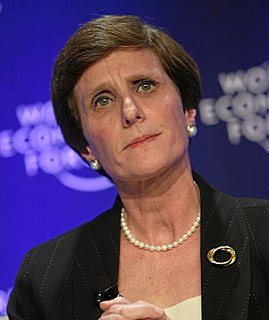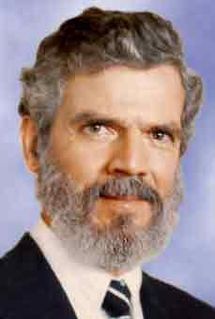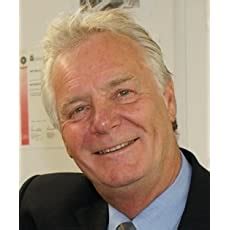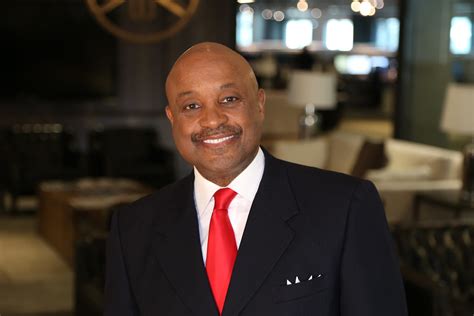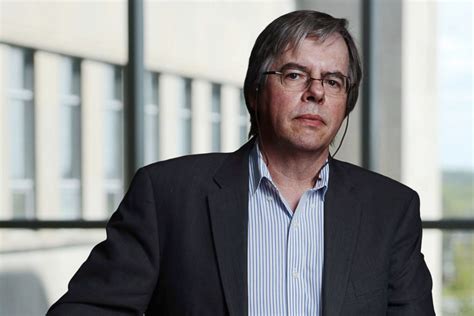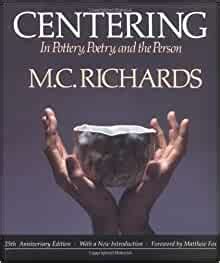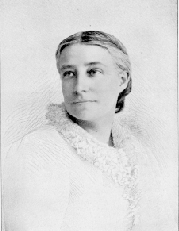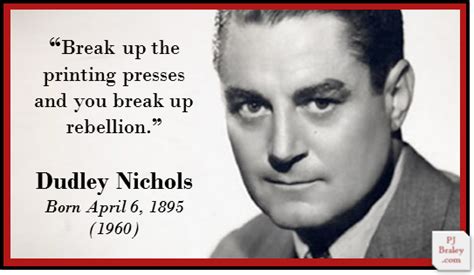Top 1200 Moral Growth Quotes & Sayings - Page 13
Explore popular Moral Growth quotes.
Last updated on December 12, 2024.
Inflation is certainly low and stable and, measured in unemployment and labour-market slack, the economy has made a lot of progress. The pace of growth is disappointingly slow, mostly because productivity growth has been very slow, which is not really something amenable to monetary policy. It comes from changes in technology, changes in worker skills and a variety of other things, but not monetary policy, in particular.
It is not ignoble to feel that the fuller life which a sad experience
has brought us is worth our personal share of pain. The growth of higher feeling
within us is like the growth of faculty, bringing with it a sense of added strength.
We can no more wish to return to a narrower sympathy than painters or musicians
can wish to return to their cruder manner, or philosophers to their less complete formulas.
To build and sustain brands people love and trust, one must focus-not only on today but also on tomorrow. It's not easy...but balancing the short and long term is key to delivering sustainable, profitable growth-growth that is good for our shareholders but also good for our consumers, our employees, our business partners, the communities where we live and work, and the planet we inhabit
Why does everyone take for granted that we don't learn to grow arms, but rather, are designed to grow arms? Similarly, we should conclude that in the case of the development of moral systems; there's a biological endowment which in effect requires us to develop a system of moral judgment and a theory of justice, if you like, that in fact has detailed applicability over an enormous range.
How much atonement is enough? The bombing must be allowed as at least part-payment: those of our young people who are concerned about the moral problem posed by the Allied air offensive should at least consider the moral problem that would have been posed if the German civilian population had not suffered at all.
Moral improvement (or perfecting) require an evolution leading to a higher consciousness, which is the true torch of life; it is what we have failed too much to appreciate, and that which would be fatal to fail to appreciate any longer ("pluslongtemps", Fr.); For if we do not take it upon ourselves to remedy in time to the moral colapse (or bankruptcy) that already threaten, the whole civilisation will risks to disappear.
It should be apparent that the belief in objectivity in journalism, as in other professions, is not just a claim about what kind of knowledge is reliable. It is also a moral philosophy, a declaration of what kind of thinking one should engage in, in making moral decisions. It is, moreover, a political commitment, for it provides a guide to what groups one should acknowledge as relevant audiences for judging one's own thoughts and acts.
Our knowledge and our ability to handle our problems progress through the open conflict of ideas, through the tests of phenomenological adequacy, inner consistency, and practical-moral consequences. Reason may err, but it can be moral. If we must err, let it be on the side of our creativity, our freedom, our betterment.
Prayer is often a temptation to bank on a miracle of God instead of on a moral issue, i.e., it is much easier to ask God to do my work than it is to do it myself. Until we are disciplined properly, we will always be inclined to bank on God's miracles and refuse to do the moral thing ourselves. It is our job, and it will never be done unless we do it.
The strong and undeniable fundamentals of low-cost clean energy and the cheapest petrochemical feed-stocks in the world will prevail we believe and we're seeing the demand pool beginning to grow. We have continued to position ourselves in a way that will catch this very sustainable and fundamentally supported wave of volume growth and at the same time, help our customer base achieve their lofty goals of growth as well.
I declare that this government is no longer a constitutional and moral form of government. I will deal with it, and I will obey its laws, and I will support it when it is defending our country from foreign and domestic enemies. I will vote in its elections and participate in its political debates. But I will never accept it. I aim at a restoration of constitutional and moral order.
Every day we make our way through a moral forest, along pathways ever branching. Often we get lost. When the array of paths before us is so perplexing that we can't make a choice, or won't, we can hope that we will be given a sign to guide us. A reliance on signs, however, can lead to the evasion of all moral obligations, and thus earn a terrible judgment.
We have the - the longest, friendliest border, you know, for the - for the longest time in the history - in recorded history, really, with Canada. And they get to sit on their moral perch, you know, take the moral high ground, say, oh, United States, shame on you about Iraq. They make us look bad internationally. And it's really not fair.
The fact that a belief has a good moral effect upon a man is no evidence whatsoever in favor of its truth. I'm not contending in a dogmatic way that there is not a God. What I'm contending is that we don't know that there is. I don't like the word "absolute." I don't think there is anything absolute whatever. The moral law, for example, is always changing. At one period in the development of the human race, almost everybody thought cannibalism was a duty.
What the world needs today is a definite, spiritual mobilization of the nations who believe in God against this tide of Red agnosticism. It needs a moral mobilization against the hideous ideas of the police state and human slavery. I suggest that the United Nations should be reorganized without the Communist nations in it. It is a proposal based solely upon moral, spiritual and defense foundations. It is a proposal to redeem the concept of the United Nations to the high purpose for which it was created. It is a proposal for moral and spiritual cooperation of God-fearing free nations. And in rejecting an atheistic other world, I am confident that the Almighty God will be with us.
What does this word holiness really mean? Is it a negative kind of piety from which so many people have shied away? No, of course not! Holiness in the Bible means moral wholeness-- a positive quality which actually includes kindness, mercy, purity, moral blamelessness and godliness. It is always to be thought of in a positive, white intensity of degree.
For equity markets, the combination of low interest rates, strong economic growth and low inflation has proved very beneficial, with global share markets rising solidly in each of the past three years. This has been underpinned by strong growth in profits so that, notwithstanding the rise in share prices, P/E ratios have been declining on average.
Conscience is the most dangerous thing you possess. If you wake it up, it may destroy you. To live a life of total moral rigor is not necessarily the way to go. It's the path for very few people. Most people need to come up with some kind of middle ground that satisfies their practical, moral, and philosophical esthetic needs.
The moral government of God is a movement in a line onwards towards some grand consummation, in which the principles, indeed, are ever the same, but the developments are always new - in which, therefore, no experience of the past can indicate with certainty what new openings of truth, what hew manifestations of goodness, what new phases of the moral heaven may appear.
I'm working with wind, solar, and biofuels companies as well as with organizations like ACORE [American Council On Renewable Energy], Growth Energy, and AREDAY to raise public awareness and seek practical technological solutions to reduce our reliance on fossilized carbon. My book Don't Wait for the Next War will be out in October, where I will offer my prescription for America's growth, responsible development, and security.
Gratitude is not a spiritual or moral dessert which we may take or push away according to the whims of the moment, and in either case without material consequences. Gratitude is the very bread and meat of spiritual and moral health, individually and collectively. What was the seed of disintegration that corrupted the heart of the ancient world beyond the point of divine remedy...? What was it but ingratitude?
The phenomenon of economic ignorance is so widespread, and its consequences so frightening, that the objective of reducing that ignorance becomes a goal invested with independent moral worth. But the economic education needed to reduce such ignorance must be based on austere, objective, scientific content—with no ideological or moral content of its own.
Life never was intended to be easy. Rather, it is a period of proving and growth. It is interwoven with difficulties, challenges, and burdens. We are immersed in a sea of persistent, worldly pressures that could destroy our happiness. Yet these very forces, if squarely faced, provide opportunity for tremendous personal growth and development. The conquering of adversity produces strength of character, forges self-confidence, engenders self-respect, and assures success in righteous endeavor.
The social intuitionist model offers an explanation of why moral and political arguments are so frustrating: because moral reasons are the tail wagged by the intuitive dog. A dog’s tail wags to communicate. You can’t make a dog happy by forcibly wagging its tail. And you can’t change people’s minds by utterly refuting their arguments.
Over the longer term, China will grow by about 6% or 7% per year. The Chinese authorities usually react pretty quickly to unfolding economic events, and you've seen them recently change a whole bunch of policies to be more conducive to growth. They have the power and capability to macromanage the economy - to accomplish their growth objectives - which means they're pretty much going to come close to what they say is going to happen.
Science is a magnificent force, but it is not a teacher of morals. It can perfect machinery, but it adds no moral restraints to protect society from the misuse of the machine. It can also build gigantic intellectual ships, but it constructs no moral rudders for the control of storm tossed human vessel. It not only fails to supply the spiritual element needed but some of its unproven hypotheses rob the ship of its compass and thus endangers its cargo.
We raised the matter of an agreement that was reached at the Growth and Development Summit, which was that we should access a certain part, 5% was mentioned, of the funds in the hands of the institutional investors, domestically, for investment in the real economy. That being an agreement of the Growth and Development Summit, we will engage South African business to see how we can make that a practical thing. So, there is a different set of engagement with local business.
The strength of an individual is not in his extreme freedom and libertine lifestyle, but in the stalwartness of his character and his moral vigor. The society is made of individuals. What is true for an individual is also true for the society. A society that is not founded on moral values is doomed to fall.
I am among those who believe that our Western civilization is on its way to perishing. It has many commendable qualities, most of which it has borrowed from the Christian ethic, but it lacks the element of moral wisdom that would give it permanence. Future historians will record that we of the twentieth century had intelligence enough to create a great civilization but not the moral wisdom to preserve it.
Many people have written about the economic meaning of globalization; in One World Peter Singer explains its moral meaning. His position is carefully developed, his tone is moderate, but his conclusions are radical and profound. No political theorist or moral philosopher, no public official or political activist, can afford to ignore his arguments.
It is my assumption that growth in faith is the root of all spiritual growth and is prior to all disciplines of works. True spirituality is not a superhuman religiosity; it is simply true humanity released from bondage to sin and renewed by the Holy Spirit. This is given to us as we grasp by faith the full content of Christ's redemptive work: freedom from the guilt and power of sin, and newness of life through the indwelling and outpouring of his Spirit.
The bourgeoisie, which far surpasses the proletariat in the completeness and irreconcilibility of its class consciousness, is vitally interested in imposing its moral philosophy upon the exploited masses. It is exactly for this purpose that the concrete norms of the bourgeois catechism are concealed under moral abstractions...The appeal to abstract norms is not a disinterested philosophic mistake but a necessary element in the mechanics of class deception.
And the moral of the story is that you don't remember what happened. What you remember becomes what happened. And the second moral of the story, if a story can have multiple morals, is that Dumpers are not inherently worse than Dumpees - breaking up isn't something that gets done to you; it's something that happens with you.
It is through solving problems correctly that we grow spiritually. We are never given a burden unless we have the capacity to overcome it. If a great problem is set before you, this merely indicates that you have the great inner strength to solve a great problem. There is never really anything to be discouraged about, because difficulties are opportunities for inner growth, and the greater the difficulty the greater the opportunity for growth.
From the seed grows a root, then a sprout; from the sprout, the seedling leaves; from the leaves, the stem; around the stem, the branches; at the top, the flower. . . We cannot say that the seed causes the growth, nor that the soil does. We can say that the potentialities for growth lie within the seed, in mysterious life forces, which, when properly fostered, take on certain forms.
The Consequentialist trinity is typically regarded in this way: Bentham is crude, Mill's writings are full of howlers and inconsistencies, and Sidgwick was too smart to fully embrace Consequentialism. All of these great traditions in moral philosophy express strands of our moral consciousness and they should all be treated as research programs rather than as fully determinate views that can be leveled by a counterexample or by a clever argument.
... life is moral responsibility. Life is several other things, we do not deny. It is beauty, it is joy, it is tragedy, it is comedy, it is psychical and physical pleasure, it is the interplay of a thousand rude or delicate motions and emotions, it is the grimmest and the merriest motley of phantasmagoria that could appeal to the gravest or the maddest brush ever put to palette; but it is steadily and sturdily and always moral responsibility.
In the spiritual domain, criticism is love turned sour. In a wholesome spiritual life there is no room for criticism. The critical faculty is an intellectual one, not a moral one. If criticism becomes a habit it will destroy the moral energy of the life and paralyse spiritual force. The only person who can criticise human beings is the Holy Spirit.
Moral theory develops from the divine command theory of medieval Christian philosophy, mixed up with a bit of ancient pagan virtue theory, to the purely secular moral sentiment and interpersonal reaction theories of Smith and Hume, to Kant's attempt to restore command theory but with something supersensible in the individual rather than God as the source of authority.
All voting is a sort of gaming, like checkers or backgammon, with a slight moral tinge to it, a playing with right and wrong, with moral questions; and betting naturally accompanies it. The character of the voters is not staked. I cast my vote, perchance, as I think right; but I am not vitally concerned that right should prevail. I am willing to leave it to the majority.
When a human body is out of balance we call that disease, which indicates dis-ease of the body. Likewise, when the body of Christ becomes unbalanced, disease occurs... Health will occur only when everything is brought back into balance. The task of church leadership is to discover and remove growth-restricting diseases and barriers so that natural, normal growth can occur.
Above all, do not give up your moral and political autonomy by accepting in somebody else's terms the illiberal practicality of the bureaucratic ethos or the liberal practicality of the moral scatter. Know that many personal troubles cannot be solved merely as troubles, but must be understood in terms of public issues and in terms of the problems of history making.
Jesus of Nazareth could have chosen simply to express Himself in moral precepts; but like a great poet He chose the form of the parable, wonderful short stories that entertained and clothed the moral precept in an eternal form. It is not sufficient to catch man's mind, you must also catch the imaginative faculties of his mind.
Has Bill Clinton inspired idealism in the young, as he himself was inspired by John F. Kennedy? Or has he actually reduced their idealism? Surely part of the answer lies in Clinton's personal moral lapse with Monica Lewinsky. But more important was his sin of omission - his failure to embrace a moral cause beyond popularity.


